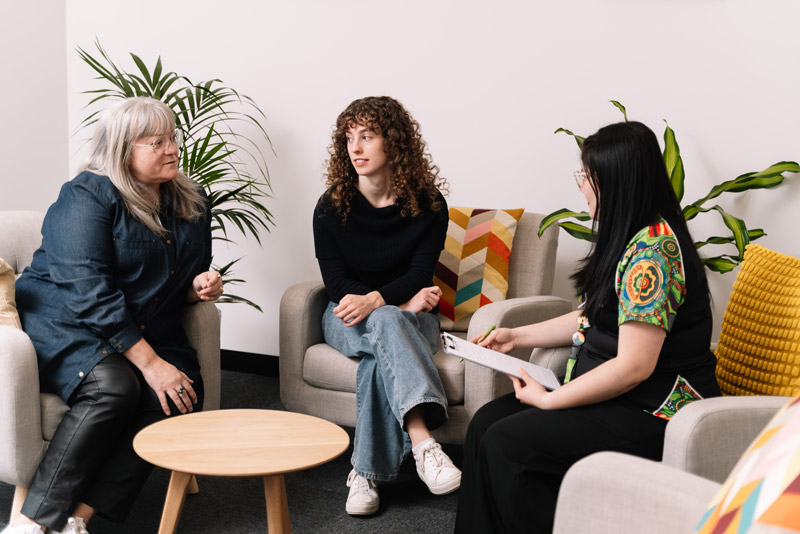If you are supporting a young person as they prepare to start a new job, your encouragement and presence can help make the experience more positive and empowering.
This article includes some simple suggestions for family to help support young people to prepare, settle in, and stay on top of their wellbeing as they begin their new role.
Setting up for success
First job essentials
Starting a new job often comes with a lot of forms to complete and documents to gather, which can sometimes feel overwhelming. Offering to go through the paperwork together, go along to the bank, or share how you stay organised may help a young person feel more in control. It also reminds them they don’t have to figure everything out on their own.
Here are some common essentials to consider:
- Tax File Number (TFN) – This is a unique number issued by the Australian Taxation Office (ATO) and is needed for a person to work legally in Australia. Without a TFN, more tax may be taken from their pay than required. If the young person doesn’t have one, they can apply online through the ATO website.
- Bank account for wages – Employers require a valid bank account to deposit wages. Encourage the young person to open an account in their name with online banking access, so they can independently monitor their pay and savings. You could offer support as needed to help them set this up.
- Superannuation account – If they are over 18 (or under 18 working more than 30 hours a week), employers must contribute to a super fund. The young person can choose a preferred super fund or have one assigned by the employer. It’s best to stay with the same fund when moving between jobs to avoid unnecessary fees.
- Police Check, Working with Children Check (WWCC) or Working with Vulnerable People Registration (WWVP) – Some jobs require a background check, particularly those involving children, older adults or people with a disability. Each state has its own application process, and the check usually involves gathering identity documents and paying a fee. Applications can typically be made online through your state’s authority.
Tip: It's a good idea to keep all of this information together in a secure place. This can make things easier down the track as they may need to access these details again.

Work supplies
Planning ahead can help ease some of the first-day nerves. There may be some initial costs involved in getting set up for work - for example, clothing or uniforms, footwear, tools, or even a lunchbox. Supporting the young person to explore affordable options or helping them plan for these expenses can make this more manageable. If they're connected with an Employment Service Provider, there may also be funding available to support their transition into work.
Transport
Support with planning transport can help build confidence, especially leading up to those first few days of work. You might offer to explore maps or public transport routes together, check timetables, practice driving the route ahead of time, or talk through what to do if something unexpected comes up.
Understanding their rights and responsibilities
All workers in Australia have certain rights at work. These include the right to:
- be paid at or above minimum wage
- have regular breaks
- work in a safe place
- be treated fairly without discrimination, bullying or harassment.
When young people understand their rights in the workplace, they're more likely to be able to make informed decisions about what action to take if their rights are not being respected.
While you can offer encouragement and guidance, it’s also important to respect the young person’s independence and trust them to take the lead where they feel comfortable. Let them know you’re available if they’d like to talk something through and remind them that there are other trusted supports and resources they can access.
There are some great youth-friendly resources online if they are wanting to learn more:
- Fair Work Ombudsman - Young Workers and Students.
Information about minimum wages, breaks, workplace rights, and what to do if things don’t seem right. They even run a quick online course covering these topics. - Your Rights at Work - Youth Law Australia.
Covers key work-related legal issues for young people, including contracts, bullying, discrimination, and unfair dismissal. - Safe Work Australia - Most states and territories offer online resources to help young people understand their rights and responsibilities when it comes to staying safe at work. You can find these by searching for your relevant authority (e.g. SafeWork NSW or WorkSafe Victoria).
A gentle conversation about what’s expected at work, like arriving on time or appropriate phone etiquette, can make the transition into work smoother. You might encourage them to explore workplace policies early on, so they feel confident about what to do if they’re unwell, need time off, or want to adjust their roster. It’s also worth pointing out who they can talk to if they ever feel unsure or need help.
Money matters
A new job offers more than just an income - it can also be a time of growing financial independence and evolving responsibilities. It’s a great opportunity to have conversations around managing money that can build inner confidence and financial literacy.
Here are some ideas of topics you could explore together:
- Look over a payslip and identify the different figures and deductions.
- Talk about how tax and superannuation work and where that money goes.
- Explore ways to manage income through saving, budgeting, or setting some financial goals.
- Share any tools, tips, or apps you’ve found useful for managing your money.
Adjusting to a new routine
Starting a new job often means changes to daily routines, schedules and energy levels. Everyone adjusts differently, so it can be helpful to talk with the young person beforehand about what their new routine might look like, and what could support them in making the shift. Asking something like, ‘Is there anything you'd like to do to help prepare for the changes to your week?’ can be a good starting point.
Adjusting to new expectations and social dynamics in the early stages of work can also be physically and mentally exhausting. It’s common for young people to feel more tired or emotionally stretched than usual, and they may need extra downtime to recharge.
Awareness of their need to rest, along with some flexibility around household or family expectations, may give them the space they need to adjust and find their rhythm. Even small gestures, like packing some snacks, cleaning their work uniform, or simply asking 'Is there is anything I can do to support you in your first few days?’ can go a long way in lightening the load.
It can also be helpful to look at members of your household’s schedules together - such as study, work, appointments or other commitments - so that any potential clashes can be planned for early, particularly if the young person relies on others for transport.
Working through these initial challenges together can be a good opportunity to strengthen your connection and help build the young person’s confidence when handling similar transitions in the future.
When they might need more support
While it’s important to give young people space to find their feet, it's worth keeping an eye out for subtle signs they may be needing some more support.
Watch for things like:
- Changes in sleep, appetite, or energy levels – these can be early signs of mental strain, especially if they’ve come on suddenly.
- Missing shifts or running late often – this could be a practical issue, but it can also be a sign that they’re struggling to cope.
- Negative impacts on other areas of their life – they might be struggling to keep up with study commitments or withdrawing from interests and activities that they previously enjoyed.
- Frequently talking about workplace stress – mentioning the same workplace issues repeatedly, especially if it involves a coworker or supervisor.
- Avoiding work-related conversations entirely – if they’re brushing off questions or changing the subject, it might be a sign they’re feeling discouraged or anxious about something at work.
Staying open and approachable can create space for honest conversations about how they are feeling and what support might be most meaningful for them.
Supporting mental health and wellbeing
Whether they’re settling in smoothly or facing some early challenges, there are plenty of ways you can help a young person take care of their wellbeing as they settle in to work.
Here are some suggestions to consider, even if they appear to be coping well:
Model healthy habits
Your approach to work and wellbeing can be a powerful way to normalise healthy habits. Small actions, like switching off work-related notifications after hours, or taking a sick day when you're unwell, can show the young person in your life that it's okay to set boundaries.
Prioritising your own self-care not only shows them that mental health matters to you, but it also means you’ll have more to give when they need you. Keep an eye out for signs that you’re feeling run down or overwhelmed, like struggling to sleep, feeling irritable or easily upset. Reach out for support when you need it, whether that’s from friends, family, community or through professional support.
Acknowledge progress
Celebrate how much they have achieved. Maybe they’ve learned something new, handled a tough situation or challenged themselves. Naming these wins out loud, and validating difficulties at work can build resilience and remind them they’re growing and capable.
Check in without pressure
Ask open questions like, ‘How’s work going at the moment?’, and try to listen without jumping in to solve issues straight away. Sometimes having someone to talk it through with can help them consider different perspectives and find their own clarity.
Help protect their rest and recovery
Finding a balance between what's best for them and what's best for their employer can take some practice. It can sometimes be hard for a young person to turn down extra shifts or longer hours, even when they're already feeling stretched. You might offer to help them navigate these difficult conversations, schedule in time for self-care, set healthy boundaries and do things they enjoy outside of work, such as sport, hobbies or catching up with friends.
Seek professional help
If you're concerned about their wellbeing and want to open a conversation, you might say something like: ‘I’ve noticed a few changes lately – want to talk about it?’. There are some great tips here on how to start the conversation about mental health.
They may feel more comfortable speaking with someone else, such as another trusted family or community member. You could also suggest a mental health support service and offer to help them get connected. Check out headspace services for young people or family, or find more suggestions of how to support your young person’s mental health.
Starting work can feel like a whole new world – new routines, new people, and new pressures. But it’s also a chance for young people to find their feet, stretch their skills and discover what they’re capable of. With you in their corner, whether you're helping with the paperwork or cheering from the sidelines, you’re helping them build confidence and resilience. Every bit of progress matters, and you’re a big part of that.
Get support
If your young person is aged 15 – 25, headspace Work & Study programs are tailored to their needs and can support them in developing the skills and confidence to reach their work or study goals. It’s totally free and we have options for them to participate online via webchat, video chat or phone, as well as in-person at over 50 of our headspace centres.
You can support your young person to decide which headspace Work & Study service best suits their needs. If you’re not sure and would like to discuss some options, give us a call on 1800 810 794.
Other useful resources and support
- Support for family – free, confidential support and resources by headspace for parents, carers, and families to help them support young people’s mental health and wellbeing through online tools, 1-on-1 support, and community forums.
- Overview of mental health for family – practical tips around supporting young people’s mental health.
- Supporting your young person through major transitions – guidance on supporting young people through major transitions in young adulthood.
- Reach Out: Support services & helplines for parents of teens – List of free and low-cost telephone counselling services to parents and carers all around Australia.
- ReachOut Parents – A range of information and advice for parents of teens.
- Medicare Mental Health: Support for Aboriginal and Torres Strait Islander people – Tips for supporting Aboriginal & Torres Strait Islander people by listening, encouraging help-seeking, and looking after yourself.
- 13Yarn – A confidential one-on-one yarning opportunity with a Lifeline-trained Aboriginal & Torres Strait Islander Crisis Supporter who can provide crisis support 24 hours a day, 7 days a week.
The headspace Content Reference Group oversee and approve resources made available on this website.
Last reviewed June 2025.
Department of Employment and Workplace Relations. (2021, October 22). Supporting a young person in their first job. Job Jumpstart. https://www.jobjumpstart.gov.au/article/supporting-young-person-their-first-job
Engage to Change. (n.d.). How you can support a young person to prepare for the workplace. https://www.engagetochange.org.uk/parents-and-carers/can-support-young-person-prepare-workplace/
Kids Helpline. (2018, February 14). Starting work. https://kidshelpline.com.au/young-adults/issues/starting-work
Get professional support
If you feel you need help there are a range of ways we can support you.


